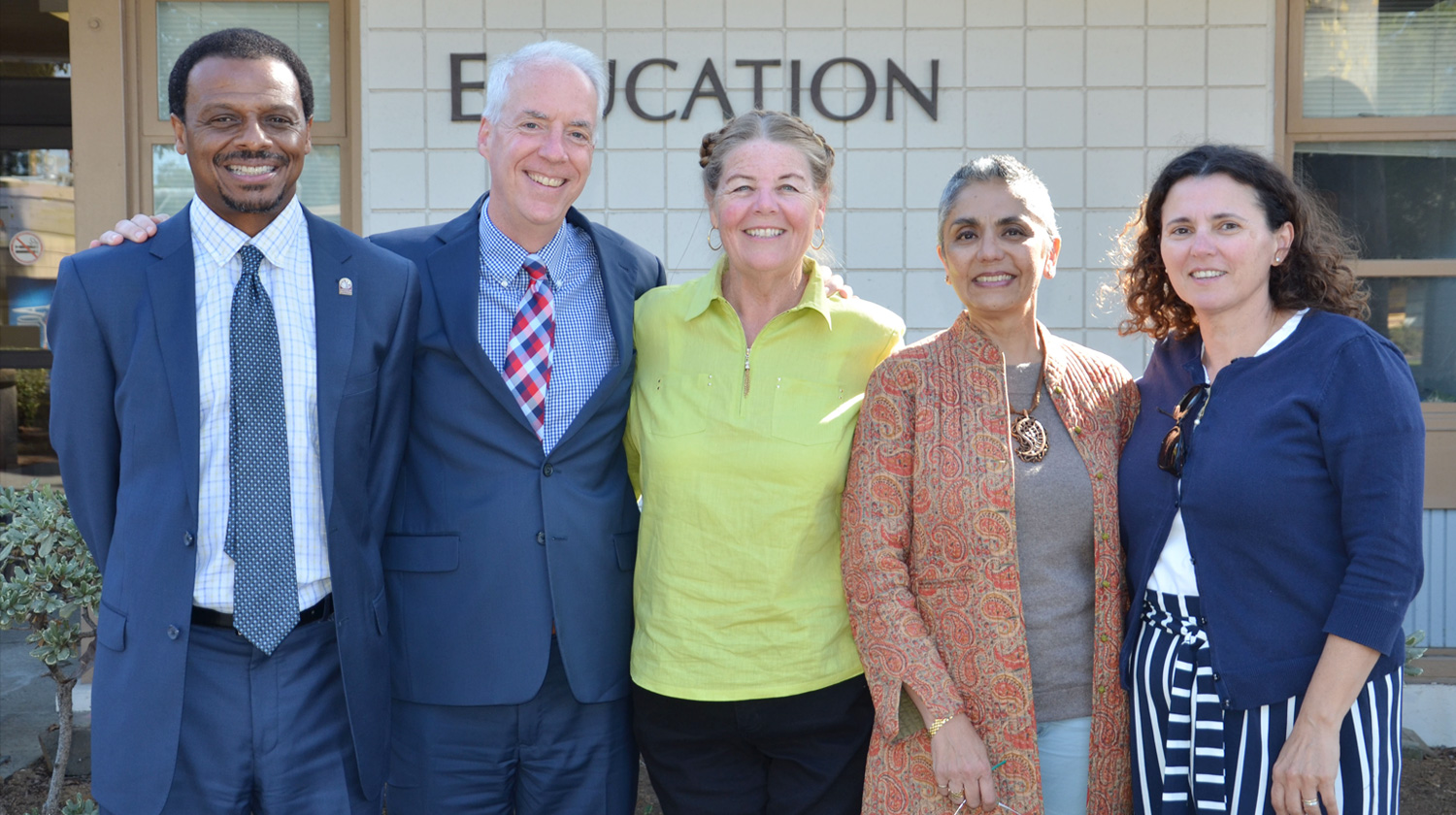
For its success in connecting its support for non-tenure-track faculty to improved mental health counseling for students, California State University, Dominguez Hills (CSUDH) has been honored with the inaugural Delphi Award from the USC Rossier School of Education’s Pullias Center for Higher Education.
Announced by the Pullias Center on Oct. 16, CSUDH will officially receive the Delphi Award and its $15,000 prize Jan. 24, 2019 in Atlanta, Georgia. One four year college/university and one two-year college receive this recognition each year. Harper College, a community college in Palatine, Illinois, has also been named a recipient of the award.
The Delphi Award is an initiative of the Pullias Center’s Delphi Project on the Changing Faculty and Student Success, which aims to highlight research and best practices that support non-tenured faculty (also known as lecturers, or adjunct, contingent or part-time faculty) and enhance institutions of higher education. The award winners’ work will be developed into case studies that showcase best practices and will be made available on the Delphi Project website.
“To all of us who served on the task force, the Delphi Award is both an acknowledgment of good work done to date and a call to action,” said Kirti Sawhney Celly, professor, at of marketing and former vice-chair of the Academic Senate at CSUDH. “Receiving this recognition has already served to catalyze our implementation efforts.”
According to data from the National Center for Education Statistics (NCES), non-tenure-track positions make up more than 70 percent of instructional faculty in institutions of higher education across the United States. The NCES also reports that the majority of non-tenure-track faculty work part-time, earn far less than their tenured or tenure-track counterparts, and have fewer opportunities for professional development.
Non-Tenure-Track Faculty Best Practices Task Force:
- Kirti Sawhney Celly, co-chair and professor, College of Busines, Administration and Public Policy;
- Keith Boyum, (former) special assistant to the president for strategic academic initiatives;
- Pamela Robinson, graduate education lecturer;
- John Keyantash, associate professor, of Earth Sciences;
- John Davis, dean of the College of Education;
- Kara Dellacioppa, faculty director in the Faculty Development Center;
- James Hill, interim associate vice president for Faculty Affairs and Development;
- Kaitlyn Breiner, lecturer and field experience coordinator.
In September 2017, a task force to address issues related to non-tenure-track faculty was established at CSUDH. The faculty-administration partnership was led by Laura Talamante, history professor and chair of the Academic Senate, and former university President Willie J. Hagan.
Co-chaired by Sawhney Celly and Keith Boyum, former special assistant to the president for Strategic Academic Initiatives, the task force launched a nationwide study into the contributions of non-tenure-track faculty on campus and developed best practice recommendations designed to address their pay and working conditions.
Concurrently, CSUDH made two important decisions, and non-tenure-track faculty received two wins. They received equity salary increases dedicated to lecturers and made to those whose pay fell below the CSUDH average lecturer salaries adjusted for rank and seniority. The increase was the result of productive negotiations between faculty and management, with Hagan at the helm.
“That was a huge win, but there was more to come. President Hagan also learned through the same negotiations that the university had a largely non-tenure-track faculty in the Student Health and Psychological Services Center (SHC),” said Sawhney Celly, who served as leader of the task force. “He found out that the line of students seeking counseling was long–that they were doing the best they could with the staff they had but all the students’ needs were not fully getting met. So the issue was addressed and fixed. The Delphi Award application was written around that achievement in particular. It was another great win for both our students and faculty.”
The fix consisted of raising the pay of the non-tenure-track faculty counselors in the SHC and hiring additional full-time tenure-track mental health advisers. Today, due to the Delphi Award and word-of-mouth across the California State University (CSU) system, the SHC is a well-recognized example of how providing comprehensive support for non-tenure-truck faculty can help students maintain positive health and better succeed academically.
“While it’s too soon to know, we do believe that being able to offer tenure-track positions will help with both recruitment and retention of new and existing counseling staff,” said Janie MacHarg, director of psychological services at CSUDH.
In addition to its expanded mental health services, the SHC now has the highest counselor-student ratio (1 to 1,750) in the CSU system, which also places CSUDH close to the International Association for Counseling Services’ (IACS) minimum staffing ratio recommendation of one full-time equivalent professional staff member to every 1,000 to 1,500 students.
“With these changes, tenure-track faculty now make up the vast majority in the Psychological Services Department, and they are better paid and expect more opportunities for upward career mobility,” said Sawhney Celly. “With this, we should retain our counseling faculty better, and they will be better equipped to build and maintain relationships with their student clients.”